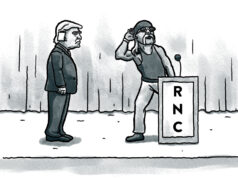
I recently came across two oddly similar quotes from unrelated sources. They were not written nor spoken in the same decade. Both begin, “We had a chance to change the world and instead we opted … .”
Stephen King, in On Writing (which he wrote in 1997 and published in 2000) finished the quote with “for the Home Shopping Network.”
Parker Palmer, in a recent On Being interview with Krista Tippett, finished it with “to get rich.” Both were lamenting the failed idealism of the ’60s.
Coming across these quotes in the same 12 hours got me thinking: Are we there again? Do we have a chance to see real change — to MAKE real change — and, if so, will we actually do it? Or will we allow ourselves to be distracted from our revolutionary thoughts by the plastic, red-neon marketing signs and decide instead to stay comfy? Will our call-to-action tweets about pumpkin-spice be all that we have to offer?
And then, after I caught myself pumping my fist in the air and feeling trés revolutionary chic, I thought about something else.
Isn’t this just so … U.S.? We love an ideal. Later, when it is uncomfortable, we hate it.
Put your fist down and go with me here.
Idealism plays to our emotions
Is it actually our obsession with idealism and our desire to believe in grand promises and righteous personal anger that allow someone like Donald Trump to be the Republican presidential nominee?
Someone somewhere feels disenfranchised, scared and angry. Trump’s rhetoric speaks right to that person. Cataloguing how vile and terrifying that rhetoric is will have to wait for another commentary, but Trump’s audience is personally angry and he’s promising big-time retribution. Although his ideals are self-serving and exclusive, the Donald is an idealist.
Another example of an idealist: Barack Obama. He promised big things, and, like it or not, he did some big things. His follow through caused Fox News talking heads to spin several times. It got uncomfortable. Discomfort always punctuates the reality of change.
The price of pragmatism
Hillary Clinton just had an audio clip leaked regarding her private opposition to an upgrade of U.S. nuclear weapons. Beyond the policy position, one of the main insights from that glimpse into an unedited moment was her insistence on not being the student running for senior class prez and promising “pizza party Fridays,” free vending machines and “no-school Mondays.” She wants to be pragmatic and realistic — and for that she sacrifices likeability. America doesn’t trust her.
Hillary is not an idealist. She cannot afford to be. Her pragmatic platform pegs her as cold and inhuman. But just as much as she knows what can be achieved and what is simply too grandiose for the office and term, she also can’t flail her arms and make wild assurances. She’s a woman. If she showed more fire and fury she would surely be branded a hormonal devil.
Sample headline: Clinton suffers from PMS, hide all nukes, chocolate.
Hillary won’t promise us pizza Friday. She is well aware that we are hungry for a revolution. In her leveled, rational and, yes, calculated vision, a revolution is exciting, but not a permanent fix.
All hail Putin’s head
So if our mothers and fathers look back to their revolutionary moment and grieve the path their generation ultimately chose, shouldn’t that give us pause? Can we pull back and take a bird’s eye view of the circus? Should we call it a “movement” instead? If we take our revolutionary ideals off the pedestal and bring them eye-level, can we forgo the sexy and immediately gratifying promises of a revolution and opt for manageable, incremental change?
I believe we should. Or 40 years from now Vladimir Putin’s preserved head in a jar will be our God as we huddle in small color-coded groups, warming our hands in front of burning barrels of trash, saying things like, “We had a chance to change the world, and instead we opted for trickle-down economics.”




















